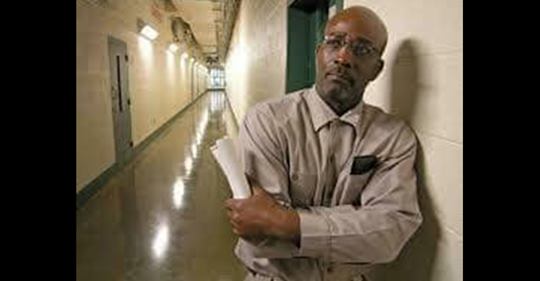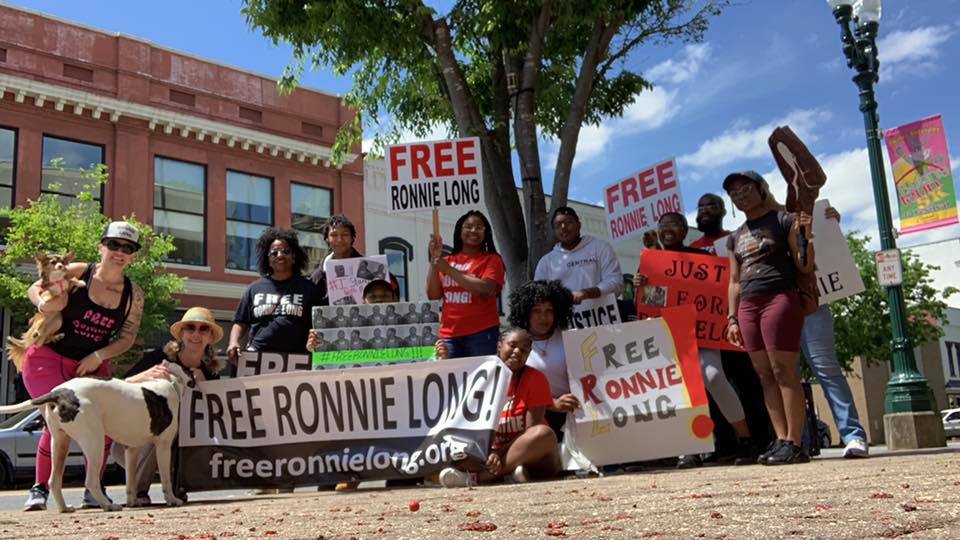Ronnie Long
from The Chronicle
by Tevin Stinson
November Spotlight On March 20, the United States Court of Appeals for the Fourth Circuit in Richmond, Va., heard oral arguments on the behalf of Ronnie Long, a North Carolina man who has been in jail for 43 years for a crime he didn't commit. While the U.S. Court of Appeals usually adheres to a 75-day timeframe to make decisions, it's been 113 days and Long is still waiting to hear from the Fourth Circuit Court.
Ronnie Long, now 63, has been in prison since he was 19 years old for a crime he didn't commit
But Long, who is a native of Concord, is staying optimistic. When asked about the outcome earlier this week, Long said he likes his chances.
"I feel as though they are taking their time doing what they do about applying the law. I'm hoping that this time we can get it right. I feel as though the longer it takes, the better my chances are," Long said.
Long's loved ones have grown to become patient as well, including his wife AshLeigh, who married Long in 2014 after leaving UNC Chapel Hill to pursue Long's case full-time. She said the waiting can be hard, but she has unwillingly learned to have patience.
"I've only been in this fight for a little over six years now. I have unwillingly learned how to have patience. Just ask Ronnie's attorney, Jamie Lau. He's had to put up with me getting upset with things not going fast enough, but I've finally learned the life skill of patience," she continued.
"Waiting sucks, it absolutely sucks, especially when I know that Ronnie is completely innocent."
The Facts
On April 25, 1976, in Concord, a 54-year-old white woman reported that she had been raped by a "yellow-looking" African American man wearing a leather jacket. According to police reports, the victim, who was the widow of a top executive at Cannon Mills, a major textile company and employer in area, told police her attacker came through a open window before pressing a knife
against her neck and ripping her clothes off.
Two weeks following the incident and after the victim was unable to pick her attacker out of a photo lineup, investigators with the Concord Police Department took the victim, who was wearing a wig, to the courthouse, told her that her attacker may or may not be in the courtroom, and asked her to identify anyone who looked "familiar."
On that same day, 19-year-old Ronnie Long was in court to settle a minor trespassing charge. Long had no idea he was being watched, but as soon as Long stood up wearing a leather jacket, the victim identified him as her attacker. She later picked Long out in a photo lineup where he was the only one wearing a leather jacket.
Later that day, officers showed up at Long's house and told him he had to go down to the station to sign papers relating to the trespassing charge and that he would be back shortly. He hasn't been back home since.
Free Ronnie Long
The Trial
Even before the trial began, it seemed as if it was set up to put the then 19-year-old teenager away for life. Many people believe the police and prosecutors were under pressure to catch the predator because of the victim's ties to one of the areas top businesses.
Those who have fought for Long's release argue that significant evidence was just ignored in Long's initial trial including an SBI report that proves Long's leather jacket and gloves had no trace of fibers from the crime scene, hairs on the victim's clothes did not match Long's, and a fingerprint lifted from the scene did not match Long.
An alibi that placed Long at home planning a high school reunion party was ignored as well.
The States' case was based solely on the fact that Long was black and owned a leather jacket, toboggan and gloves.
It is also important to note that jury in Long's trial was selected out of more than 40 potential jurors that included less than five African Americans. In the end, Long was tried by an all white jury including several who had ties to Cannon Mills. And on October 1, 1976, Long was condemned to serve two life sentences in the N.C. Department of Corrections.
"My legal documents are online; I have nothing to hide. I was a
young black man charged with sexually assaulting a very wealthy white female. I was tried by a white D.A. before a white judge and convicted by an all-white jury."
His projected release date is April 20, 2056. If he's still alive, Long will be approaching his 100th birthday.
When discussing the trial with students from Winston-Salem State University via phone call earlier this year, Long said he put his faith in a system that is willing to ignore evidence, logic, and common sense.
"My legal documents are online; I have nothing to hide. I was a young black man charged with sexually assaulting a very wealthy white female. I was tried by a white D.A. before a white judge and convicted by an all-white jury." Long continued, "They have no physical or biological evidence to connect me to the crime."
The Appeal
Over the years, Long has filed several appeals but all have been dismissed. But as more evidence from the case started to come to light, including the hidden evidence mentioned earlier, and thanks to the UNC Innocence Project, a judge has ordered police and prosecutors to find and preserve all physical evidence and records.
Since 2016 Long's case has been handled by the Duke University School of Law's Wrongful Convictions Clinic. Jamie T. Lau, supervising attorney of the Duke Wrongful Conviction Clinic, said when he came across Long's case in 2014, he saw someone who fell victim to backlash from the state in response to progress that occurred in the 1960s. Lau said, "This system in North Carolina can wear you out and wear you down and that's what they've been trying to do in Ronnie's case."
Heading into the hearing in March, Lau said when looking at the evidence, it's clear that the law enforcement officers who investigated the case lied to conceal information and evidence that proved Long was innocent.
During the hearing in Richmond, Lau and his team which included more than 30 professionals and the N.C. Innocence Project, argued that the unreliability of eye witness identification, the discovered fingerprint that did not match Long's. According to Long's wife AshLeigh, when presented with the evidence of the fingerprint, the judge said, "Just because it's not inculpatory
does not mean it's exculpatory."
When discussing her thoughts on the appeal, AshLeigh said because she knows how the judicial system works, she fears that the Fourth Circuit Court will send Ronnie's case back to the state.
"I worry that the Fourth Circuit will send Ronnie back to the State courts to argue the newly discovered fingerprint evidence, claiming it's due to jurisdictional reason, but really it's because all the judges in our legal system lack the courage to do their jobs," she continued. "No judge wants to overturn another judge's conviction. It's about feelings, not facts or evidence."
Whenever and whatever the decision, Long said he plans to take it in stride. He said after fighting for more than 40 years, there's no reason to give up now.
"Being innocent of the charges I'm convicted of, why would I give up now after 43 years of fighting to prove my innocence? If I give up, the opposition has won," he continued. "I feel as long as I continue to put forth that effort to overcome all forms of adversity, then the opposition can't win."
For more information on Ronnie Long's initial case or appeal, visit freeronnielong.org or visit "Free Ronnie Long" on Facebook.


